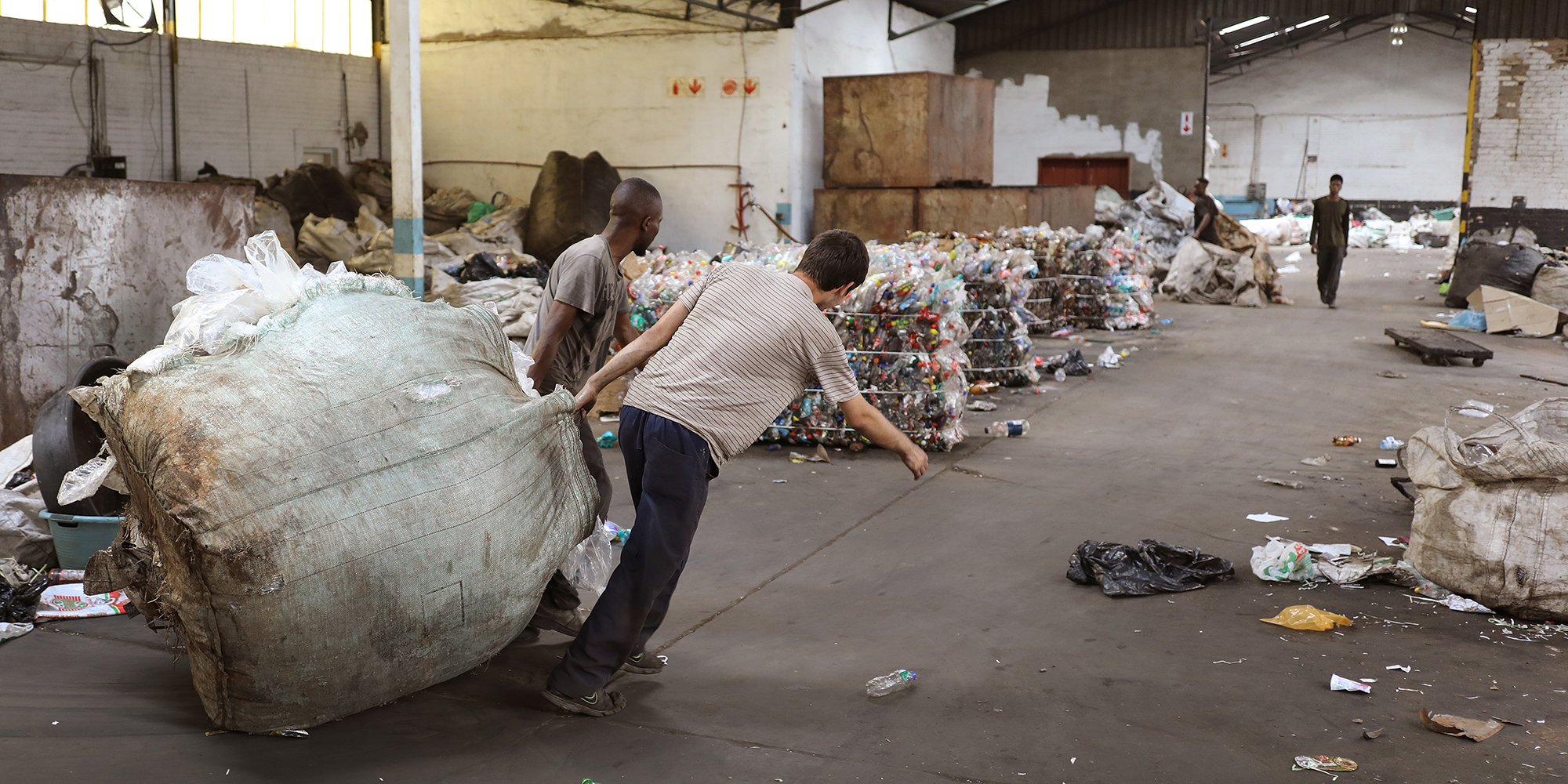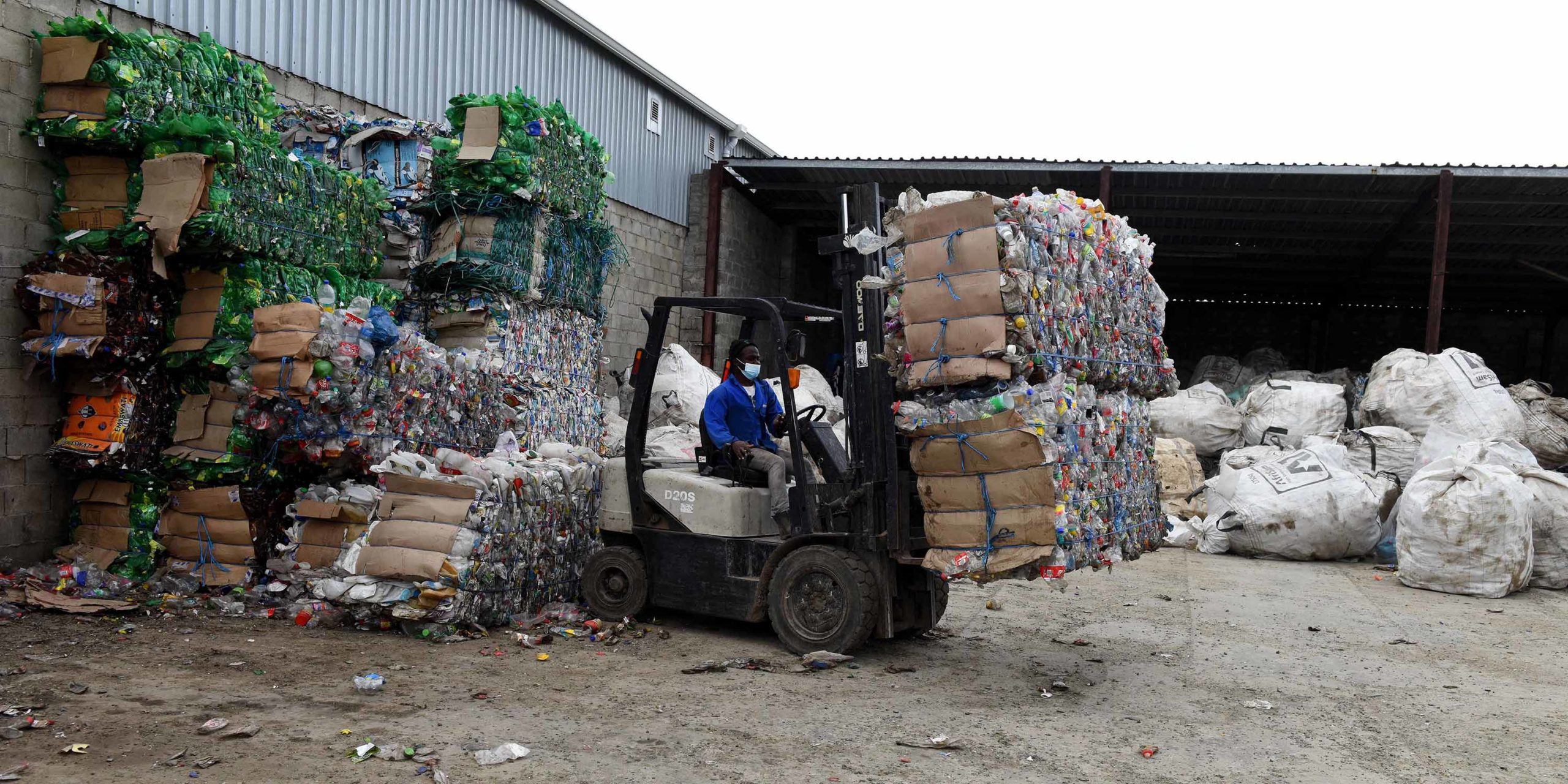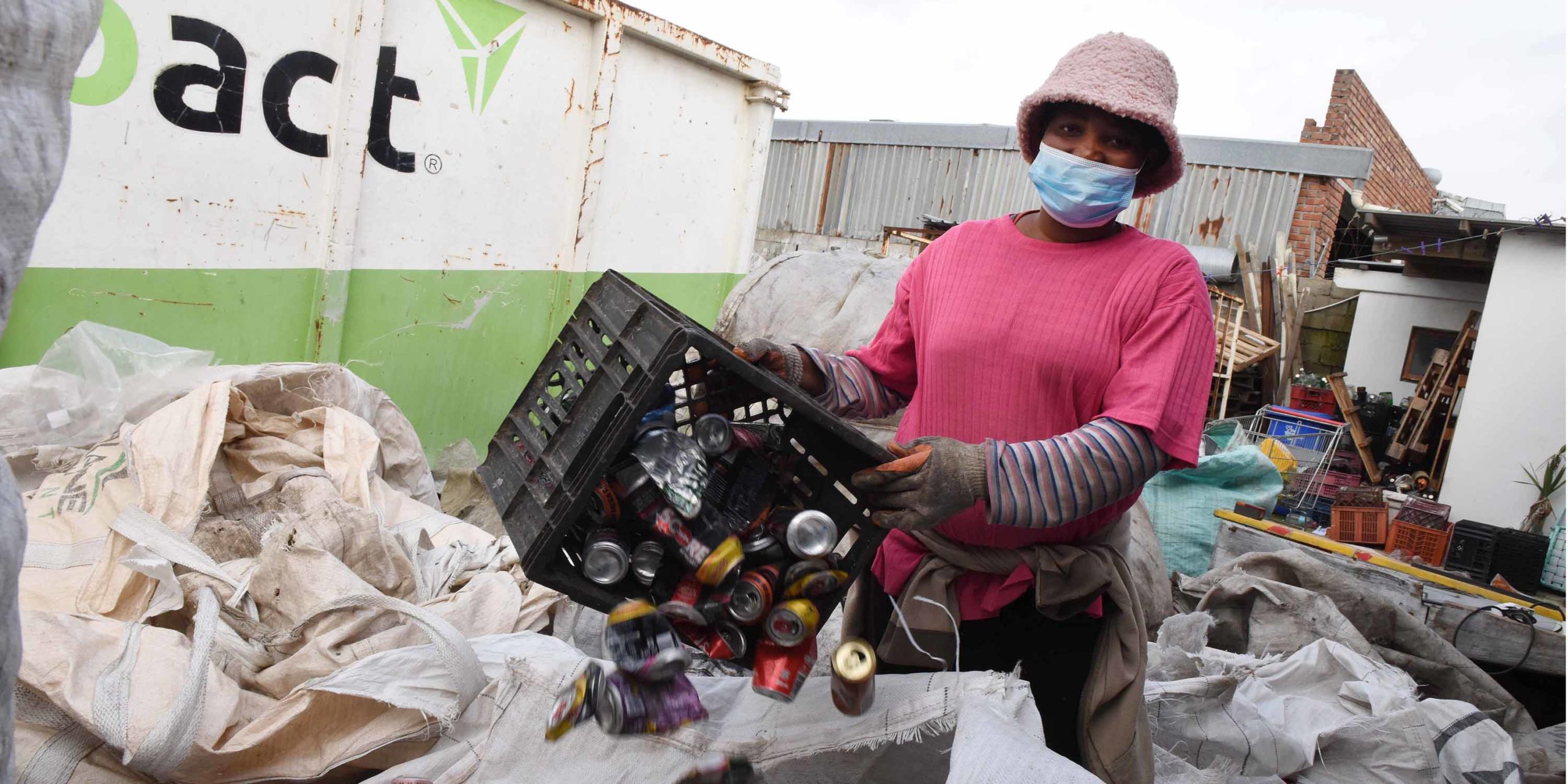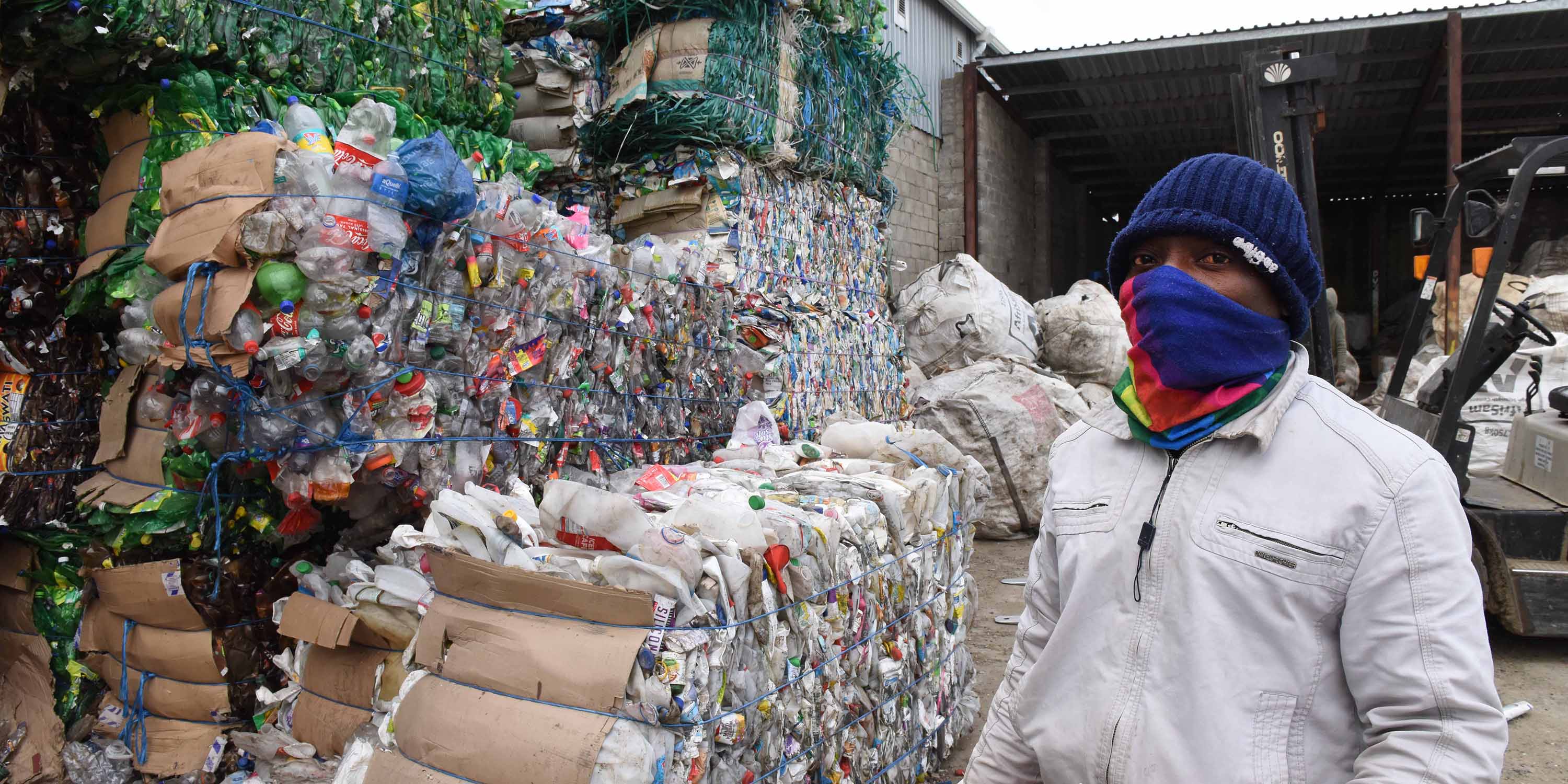First published in the Daily Maverick 168 weekly newspaper.
You may think that you are doing your part in saving the planet by separating your waste for recycling, but how much of that plastic is being given a second life?
Not as much as you think.
About 2,370 million tonnes of plastic waste is generated in South Africa every year. From that, 70% is collected, but just 14% of it (including imported waste) is recycled.
Plastic is one of the worst pollutants contributing to climate change, and consumers often feel guilty about using it. And the fact is that you, the consumer, have little power to control what happens to it because not all plastics are equal in the recycling process.
According to Edward Walker, managing member of Walkers Recycling, although there are materials labelled as recyclable that land at his recycling plant, some of these materials – such as sandwich containers, cigarette boxes, plastic soup packets and chip packets – are often rejected by recyclable material buyers.
This is because these materials are not viable for recycling as they cause recycling machinery to spark and temporarily malfunction.
Retailers put the recycling number on the packaging, “but the end supplier does not want it ... then we end up dumping it because we need to reduce the waste”, Walker says.
Although there are no regulations to ensure that retailers and packaging companies use the recyclable or recycled materials they claim to use on their packaging, new Extended Producer Responsibility (EPR) regulations are a step in the right direction.
The laws aim to hold plastic producers accountable, ensuring that the responsibility of reducing plastic waste doesn’t fall solely on consumers.
The regulations require that any company or brand that makes or imports plastic packaging for distribution must pay an EPR fee.
The policy is a means to minimise waste, ensuring materials retain their highest quality and will assist in the transition towards a circular plastics economy.
Albi Modise, chief communications director of the Department of Forestry, Fisheries and the Environment (DFFE), says South Africa’s policy on waste management has changed from a collection-to-disposal approach to a focus on supporting the growth and development of the waste recycling economy.
 Workers at a recycling plant with collected plastics in Johannesburg, South Africa. (Photo: EPA-EFE / KIM LUDBROOK)
Workers at a recycling plant with collected plastics in Johannesburg, South Africa. (Photo: EPA-EFE / KIM LUDBROOK)
Accountability
However, Angelo Louw, the digital mobilisation officer at Greenpeace Africa, disagrees that EPR regulations will assist with holding plastic producers accountable.
The EPR regulations are “enabling the plastics industry to continue greenwashing since it places so much emphasis on the so-called solutions that industry pushes – that is, recycling,” he says.
“The language [DFFE] is starting to use around profiting and economic stimulation shows how heavily they have been influenced by business.”
“Most consumers will know what plastic is, but all the nuances around which plastic is recycled, what plastic is good, what plastic is bad: no idea!” says Lorren de Kock, the WWF South Africa’s project manager on the circular plastic economy.
Rowan le Roux, chief security officer of recycling packaging company Designed For Earth and chief operating officer of Oryx Desert Salt, argues that consumers should take responsibility for what they do with their plastic, but that it didn’t help that people were not given a means by which to change their habits.
“We’re focusing on recycling, we’re focusing on blaming the consumer, yet our first step should have been how do we manage the infrastructure needed to manage and maintain packaging in such a way that it does not end up being a leakage into the environment,” Le Roux says.
A WWF 2020 report points to plastic packaging being a “leaking hotspot” for waste, as 52% of raw plastic material – both made in South Africa and imported – is used for packaging.
“There are certain industries that just see [plastic] as a waste problem, but actually it’s so much more than that. It’s a production problem, as well as a consumption problem” De Kock says.
A linear plastics model follows a path of make, use and then dispose, while a more circular model keeps resources in use for as long as possible, extracting the maximum value from them, then recovering and regenerating products and materials at the end.
De Kock says a shift to a more circular model was important in keeping plastic at its highest value but still recyclable, while not having to constantly go back to the extraction of natural resources to produce it.
But Louw contends that we cannot rely on the plastics industry to solve the problem that they are causing.
“The plastics industry likes to sell us the notion of sustainability so that they appear to be addressing people’s concerns without changing at all. Selling plastic is at the heart of their profit making,” Louw told DM168.
 Shafik Panganani in the recycle yard at Walker Recycling. (Photo: Nasief Manie)
Shafik Panganani in the recycle yard at Walker Recycling. (Photo: Nasief Manie)
Plastics pact
Early last year, plastic industry stakeholders from business, government and NGOs came together to form the South Africa Plastics Pact, a first of its kind on the African continent and the first African pact to join the Ellen MacArthur Foundation’s global Plastics Pact Network.
The pact, according to the foundation’s website, is a collaborative initiative to “implement solutions towards a circular economy for plastic”.
Le Roux describes the pact as a great initiative that is “really nice” but says its initiatives are ambitious and it hasn’t quite closed the loop on the circular economy.
The pact, he adds, is “a Band-Aid, with all due respect”.
Some of the pacts’ 2025 targets include taking action on problematic or unnecessary plastic packaging; 100% of plastic to be reusable, recyclable or compostable; 70% of plastic packaging to be effectively recycled; and 30% of all plastic packaging to be recycled content.
In June, a DFFE leaked draft policy showed that the department was considering placing a tax on single-use plastic items such as straws, plastic beverage bottles and caps, stirrers, food wrappers, etcetera. Modise says the government was also looking at other possible solutions to dealing with single-use plastic.
“The department, in this financial year, is conducting a survey that seeks to understand the extent of the flow of single-use plastics, their economic, social and environmental benefits and counter-benefits, with an aim to propose a targeted policy instrument to address their unintended consequences on the environment,” Modise says.
Greenpeace campaigner Louw says it is feasible for South Africa to transition away from single-use plastic to innovative distribution models that rely on reuse and refill systems.
“That is the only sustainable option for us,” he says. “Many other countries across the continent have already moved away from certain single-use items. It’s not that hard of a shift.”
 Matha Tabwera in the Walker Recycling yard sorting tin cans. (Photo: Nasief Manie)
Matha Tabwera in the Walker Recycling yard sorting tin cans. (Photo: Nasief Manie)
Pushback
There has been resistance to the proposed transition to more sustainable plastic solutions from some industry bodies, which have played the “development over the environment” card, saying that a shift to sustainable practices could result in job losses and, therefore, a decrease in fiscus contributions.
According to De Kock, there are progressive industry players and there are the “bad guys” who are funded by petrochemical companies (raw plastic materials producers), who are wanting to protect their businesses.
Research by the Ellen MacArthur Foundation shows that a shift to a plastics circular economy could create 700,000 jobs by 2040 in addition to reducing plastic leakage by 80%, reducing greenhouse gas emissions by 25%, and generating savings of $200-billion a year.
“The benefits are there,” says De Kock. “It’s a specific narrative that is being pushed.”
He says it is petrochemical companies and brand owners that benefit from the plastic industry and everyone downstream from there was getting the short end of the stick due to the price of plastic being linked to the price of oil and gas.
“It’s the whole thing about the ‘just transition from coal to renewable energy’. [The plastics] industry hasn’t even gotten there.
“They haven’t even worked out that there are going to be large tracts of their production that are going to be unsustainable long term,” Le Roux says.
He says that to reach sustainability, factory workers are going to lose their jobs as companies adapt to manufacturing sustainable plastic and products.
Alternatives to plastic are necessary, even though companies are not looking into those.
“We’re the ones that have to change if we want to survive, ultimately,” Le Roux says. DM168
WHAT CAN BE RECYCLED?
- Most plastic containers such as cool drink and water bottles, cleaning product bottles, milk bottles, yogurt pots, margarine and ice cream tubs
- Soft plastic bags and packaging
- Clingwrap, pallet wrap and bubble wrap
- Crackly shopping bags
- Chunky, white polystyrene (such as used to package electronic items)
- Plastic items such as garden chairs, buckets, flower pots
- Some trays used to package fruit and vegetables (but not if made of PET or black polystyrene)
WHAT CAN’T BE RECYCLED?
- Black soft plastic
- Black rigid trays
- Black polystyrene trays
- White polystyrene trays, containers, cups
- Plastic trays made from PET
- Plastic contaminated with oil, paint or glue, or plastic bonded with paper such as laminated paper
- Plastic items containing metal parts (like screws) which cannot easily be removed
- Chip packets, tea bag wrap and many biscuit wrappers
This story first appeared in our weekly Daily Maverick 168 newspaper which is available for R25 at Pick n Pay, Exclusive Books and airport bookstores. For your nearest stockist, please click here.





 Matha Tabwera in the Walker Recycling yard sorting tin cans. (Photo: Nasief Manie)
Matha Tabwera in the Walker Recycling yard sorting tin cans. (Photo: Nasief Manie) 